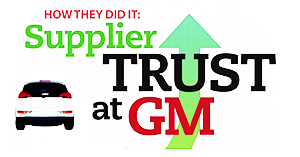What is the difference between winning in the marketplace and treading water? It could be a matter of how much your suppliers trust you. Winning the trust of the automotive supplier community was certainly the strategy behind the Strategic Supplier Engagement (SSE) initiative at GM that I profiled in the May issue of SCMR.
For years, GM had lagged in the results of the North American Automotive OEM – Supplier Working Relations Index Study, sometimes referred to as the supplier trust survey, which measures “supplier perceptions of working relations with their automaker customers,” according to Planning Perspectives, Inc., or PPI, which launched the first study in 2001. Less than optimal supplier relationships meant that GM was sometimes behind the eight ball when it came to getting first crack at the latest innovations available to automakers and in terms of its profitability.
That came as no surprise to John Henke, Jr., the president of PPI. Back in 2014, he co-authored an article in SCMR that used the results of the annual survey and the major automakers financials to demonstrate that the OEMs with the lowest supplier trust scores also generated the lowest profits per vehicle in the industry.
Last year, GM began to harvest the fruits of the SSE, posting consecutive quarters of improved financial results, having the Bolt named Motor Trend's Car Of The Year and posting impressive gains on the 2016 supplier trust index.
2016 was also a year when GM sought price concessions from its suppliers, as did Nissan. So, did it learn lessons that other automakers could benefit from? Based on the results of the 2017 Supplier Working Relations Index Study, which were released today, the answer is yes. As the headline on today's press release noted, GM, a perennial laggard in the study, jumped to third place while Nissan, often a third-place finisher behind Toyota and Honda, fell to last place.
The difference between the two companies, according to Henke, is the relationship GM has cultivated with its suppliers compared to Nissan. “GM has improved across the board in all five of the key areas that comprise the Working Relations Index ranking, and Nissan has dropped in all five,” he said in today's release. He also noted that while GM and Nissan have both had cost-cutting programs in place for the last two years, GM actively worked with its suppliers while Nissan to an adversarial approach that “has greatly disrupted relations with its suppliers and it is safe to say that it has cost them tens of millions of dollars in supplier contribution to profits.” You can read the full release here.
Or, as Joe Sandor, a former CPO and now a professor of purchasing and supply management at Michigan State, puts it: “The huge value of purchases [by manufacturers like GM] means a far greater reliance on suppliers…Clearly, only those customers who earn preferential treatment from their suppliers will thrive.”
On the eve of the 2017 ISM conference, those are words for everyone in supply management and procurement to heed. Trust me.
SC
MR


Latest Supply Chain News
- Joseph Esteves named CEO of SGS Maine Pointe
- Employees, employers hold divergent views on upskilling the workforce
- April manufacturing output slides after growing in March
- Q1 sees a solid finish with positive U.S.-bound import growth, notes S&P Global Market Intelligence
- World Trade Centers offers a helping hand to create resilient, interconnected supply chains
- More News
Latest Podcast

 Explore
Explore
Topics
Latest Supply Chain News
- Joseph Esteves named CEO of SGS Maine Pointe
- Employees, employers hold divergent views on upskilling the workforce
- April manufacturing output slides after growing in March
- Q1 sees a solid finish with positive U.S.-bound import growth, notes S&P Global Market Intelligence
- World Trade Centers offers a helping hand to create resilient, interconnected supply chains
- 6 Questions With … Sandeep Bhide
- More latest news
Latest Resources

Subscribe

Supply Chain Management Review delivers the best industry content.

Editors’ Picks




